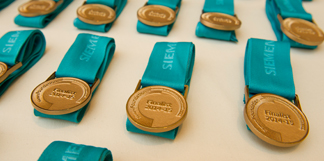Re(searching) for the Reward
How innovative and new is the rigorous scientific research that the Siemens Competition inspires?

Photo regards to Siemens Foundation
Siemens medals to be presented to the National finalists.
November 21, 2016
In a research-driven environment like ours, placing 27 of our students as Siemens semifinalists seems almost commonplace. In 2016, Jefferson students submitted nearly 50 team and individual projects to the Siemens Competition. Nineteen of them advanced to the semi-finalist stage. Of those nineteen, three, which included five Jefferson students, earned their place as the only three projects that were finalists from the entire state, marking a tremendous feat for the finalists and our school.
That’s why I was at once curious, shocked, intrigued, horrified, jealous, and later furious, when a family friend began listing familiar names as success stories of their Siemens-driven organization.
This family friend began by explaining the existence of a business that actively recruits magnet school students to its rigorous research program, designed to churn out competition-ready papers and projects. This internship-like program puts its participants through 15 hours a week of research and presentations starting from June lasting throughout August.
The tuition is high, growing into the tens of thousands, but the results prove its effectiveness; all but two of their pupils became semifinalists in Virginia, and many became Maryland’s and Virginia’s select handful of regional finalists.
However, only when the family friend began checking off program participants from the semifinalist and finalist list did my horrified and jealous emotions truly begin to kick in.
I was in utter shock that there were so many finalists, many of whom I knew, many from our own school. At the same time, I was bitterly envious, envious of students who could look to a mentor for assistance while my partner and I had had to survive our own grueling experience mostly on our own. We had no guidance during the large body of our time spent researching, and had hit literally hundreds of obstacles and dead-ends, left for us to figure out without any help.
I was shocked that I had not known about this sooner, and resentful that others had an experienced mentor to guide them through the research. An hour after the friend left, the furious part of me kicked in when I realized that the research my partner and I had painstakingly done was being purchased by others, and garnering better results than what we had accomplished independently. Titles were bought, and the spirit of inquiry in “independent research” seemed to be less important than the taste of success.
However, on further reflection, that conception of mine was partly misguided and liable to counter-arguments and controversy.
The paper was not written for these students by anybody else. The research that these students had completed was not done for them by anybody else. And most importantly of all, the ideas were not even spoon-fed to those students by anybody else. The students had an active role in every aspect of the process; partners bounced ideas and topics off of each other before deciding on one of common interest; teams dedicated those hours by their own will, and dedicated extra hours outside of the normal 15 purely through their own perseverance. The instructor only served the role of the mentor in the intern-mentor kind of relationship, and although requiring $10,000 in tuition is a bit extreme, the cost is understandable since the mentor isn’t being paid over the summer in grant money like a regular professor is.
So even though I don’t agree with the premise of the program, I can understand why parents and students may feel obligated to pursue scientific research in this way. The organizer of this program provides a systematic structure to independent research, which can be satisfying to those who prefer the safety of order rather than the uncertainty of the unknown.
As of now, I don’t agree with putting students through a regimented summer in order to enter a science competition, but in the end, are these pupils’ efforts truly any different from that of the typical intern?





